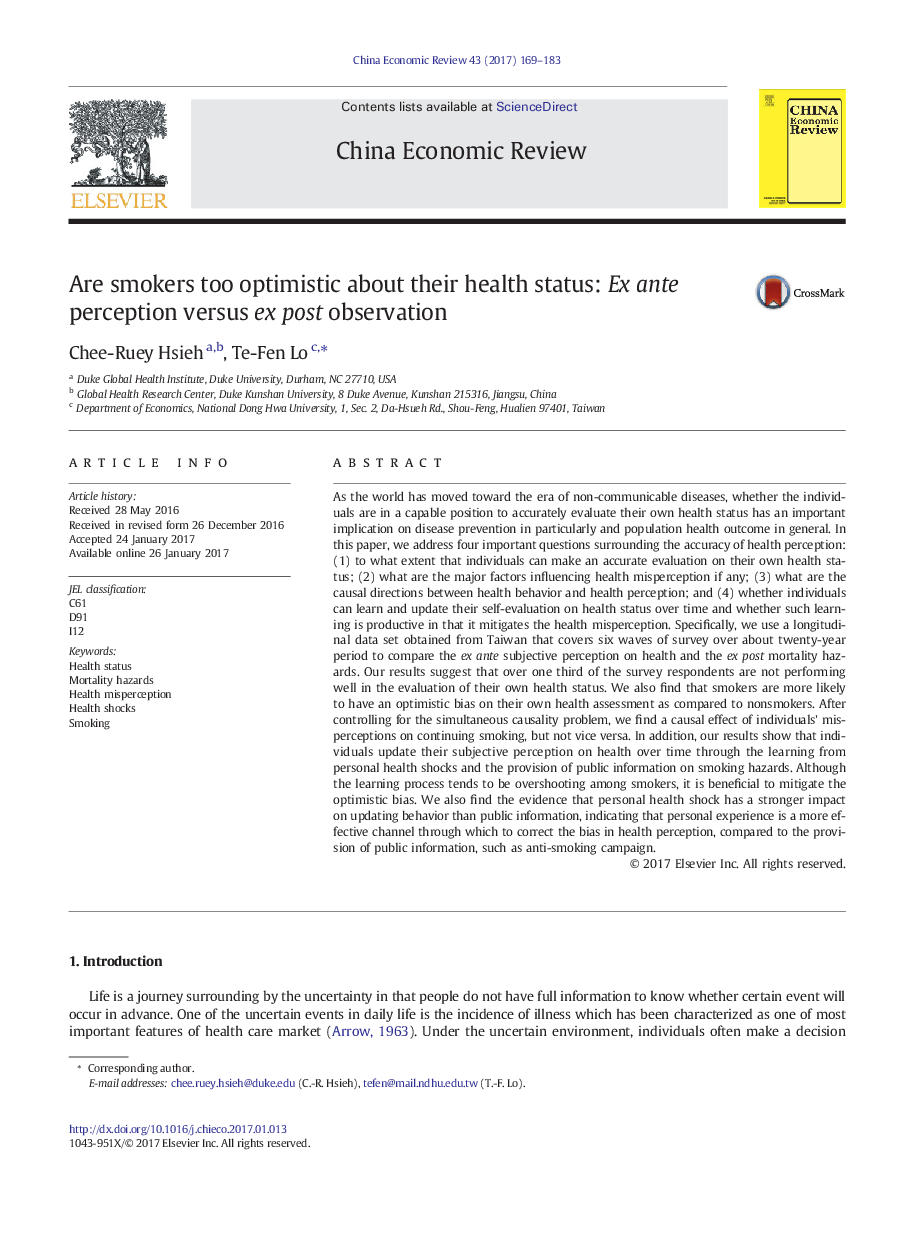ترجمه فارسی عنوان مقاله
سیگاری ها نسبت به وضعیت سلامت خود بسیار خوش بین هستند: ادراکات پیشین در مقایسه با مشاهدات گذشته
عنوان انگلیسی
Are smokers too optimistic about their health status: Ex ante perception versus ex post observation
| کد مقاله | سال انتشار | تعداد صفحات مقاله انگلیسی |
|---|---|---|
| 127574 | 2017 | 15 صفحه PDF |
منبع

Publisher : Elsevier - Science Direct (الزویر - ساینس دایرکت)
Journal : China Economic Review, Volume 43, April 2017, Pages 169-183
ترجمه چکیده
همانطور که جهان به دوران بیماری های غیر قابل انتقال منتقل شده است، آیا افراد در موقعیت توانایی خود برای ارزیابی دقیق وضعیت سلامت خود هستند، پیامدهای مهمی در پیشگیری از بیماری ها و به طور کلی نتایج سلامتی مردم دارد. در این مقاله چهار پرسش مهم درباره صحت ادراک سلامت را مطرح می کنیم: (1) تا چه اندازه افراد می توانند با ارزیابی دقیق وضعیت سلامت خودشان را ارزیابی کنند؛ (2) عوامل اصلی تاثیر گذار بر سوء مصرف سلامتی در صورت وجود؛ (3) روابط علیه رفتار سلامت و درک سلامت چیست؟ و (4) آیا افراد می توانند خود را ارزیابی وضعیت سلامتی در طول زمان را یاد بگیرند و یا اینکه آیا چنین یادگیری سازنده است یا خیر. به طور خاص، ما از یک مجموعه اطلاعات طولی که از تایوان به دست می آید استفاده می کنیم که شامل شش امواج نظرسنجی بیش از حدود بیست ساله برای مقایسه ادراک ذهنی پیشین در سلامت و خطرات مرگ و میر پس از آن است. نتایج ما نشان می دهد که بیش از یک سوم از پاسخ دهندگان بررسی ناکافی در ارزیابی وضعیت سلامت خود انجام نمی دهند. همچنین ما دریافتیم که افراد سیگاری نسبت به افراد غیر سیگاری نسبت به ارزیابی سلامت خود بیشتر در معرض تعصب خوش بینانه هستند. پس از کنترل عواقب همزمان، یک اثر علمی از سوء تفاهم افراد در مورد ادامه سیگار کشیدن پیدا می کنیم، اما نه برعکس. علاوه بر این، نتایج ما نشان می دهد که افراد در طول زمان از طریق یادگیری از شوک های سلامت شخصی و ارائه اطلاعات عمومی در مورد خطرات سیگار کشیدن، ادراک ذهنی خود را بر روی سلامت در طول زمان در بر می گیرند. اگر چه فرایند یادگیری در میان افراد سیگاری بیش از حد زیاد است، اما از بین بردن خوش بینانه تر است. شواهدی نیز وجود دارد که شوک سلامت شخصی تأثیر قویتری بر به روزآوری رفتار نسبت به اطلاعات عمومی دارد و این نشان می دهد که تجربه شخصی کانال موثرتری است که از طریق آن می توان تصحیح تعصب در ادراک سلامت در مقایسه با ارائه اطلاعات عمومی مانند ضد مبارزات انتخاباتی

